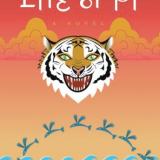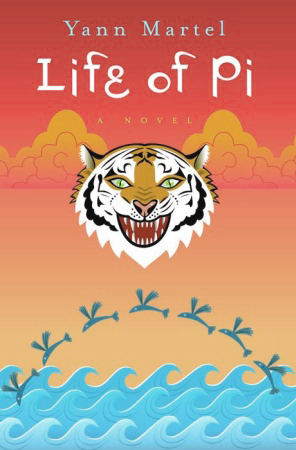Life of Pi – Yann Martel – 2001
Posted by len. on 30/4/2003, 15:55:39
I will need to marshall a few quotes to support my observations, but in general I really enjoyed this book. As I said elsewhere, for the most part I was there with Pi, until the floating vegetable island overrun with meerkats. This bizarre turn of “events” put everything in a whole new light.
The crux of this novel for me was Pi’s question to the effect of “there are two versions of this story, and one is much more interesting than the other. Which do you prefer to believe?”.
For me, truth matters a great deal more than appeal. I am deeply troubled by the clear trend in our culture to judge truth by its appeal rather than its objective reality. Decision making (in the most general sense) based on such a definition of truth can only lead to unexpected, unintended, and often adverse consequences. Reality is sufficiently bizarre that we need not believe in (as opposed to imagine and enjoy as such) fantasies.
Anyway, in a nutshell, a beautifully written book that asks the fundamental question of why we believe…
len.
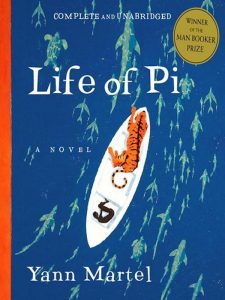
Posted by moana on 30/4/2003, 17:09:32
So, about this tiger story… 🙂
I really enjoyed this book. It was an entertaining story and a quick read for me. The idea of an animal populace on a lifeboat somehow stabilizing into the equilibrium it did was the most interesting part, to me. But honestly, I’d be hard pressed to say that this novel made me think about my beliefs… I liked it, but nothing really moved me in the story. Maybe someone else can shed some light on the story that will change my mind…
Awaiting more comments,
Moana
~
Posted by Tracy on 30/4/2003, 18:02:19
What I really enjoyed was the beginning of the book and Pi’s innocent exploration of religion. He saw nothing wrong with taking the best from each religion yet the religious leaders when they all met insisted he choose. How many times in real life do we force our children to “give up thier childish ways” Loose their imaginations. Pi was a gift just not wrapped in the expected package.
We wonder about reality and the island that is paradise by day and hell by night. For me that was not unbeliveable but what I wondered was had the island not been a danger in the evenings, could I have stayed forever. I think not as life is more then food, water and shelter. It is the daily communication between us that makes life worth living for me at any rate.
I think the end of the book brilliantly tied in the beginning of the book with the investigation and the two agents who couldn’t believe what they could not see. How many opportunities slip by because we can’t see them. Thank goodness for people who can.
Thought the book was a good read and enjoyed it.
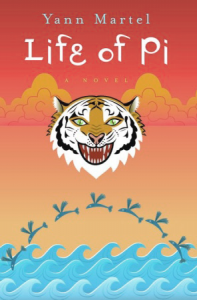
Posted by Lale on 1/5/2003, 11:18:12
Tracy says:
We wonder about reality and the island that is paradise by day and hell by night. For me that was not unbeliveable but what I wondered was had the island not been a danger in the evenings, could I have stayed forever. I think not as life is more then food, water and shelter. It is the daily communication between us that makes life worth living for me at any rate.
Yes, exactly. I was also perplexed by his statement that he could have lived there forever had the island not been “carnivorous”. But he does acknowledge the loneliness:
“I preferred to set off and perish in search of my own kind than to live a lonely half-life of physical comfort and spiritual death on this murderous island.”
Also, when he is talking about the owner of the teeth:
“And this explained the teeth. Some poor lost soul had arrived on these shores before me. How much times had he – or was it she? – spent here? Weeks? Months? Years? How many forlorn hours in the arboreal city with only meerkats for company? How many dreams of a happy life dashed? How much hope come to nothing? How much stored-up conversation that died unsaid? How much loneliness endured? How much hopelessness taken on? And after all that, what of it? What to show for it?”
So, I think we can conclude that, yes, he did consider staying there forever because it had food, fresh water and shelter. But, really, it was never the real solution for him.
If the island hadn’t turned out to be acidic, he might have stayed longer but … maybe he would die of a broken heart, of hopelessness and loneliness. Or he would have eventually taken to the ocean once again. The discovery of the acid made the decision for him, and earlier. But he might have left anyway.
The island episode was a science-fiction/fantasy marvel for me. But its presence in the story made me very very uncomfortable. I felt like I have switched books from a relatively plausible story to a semi-literary fantasy (I am thinking, here, of the lousy movie “Evolution” with David Duchovny).
Did anyone notice at the very beginning how Pi first caught sight of Orange Juice? He used the word mother. “I saw mother”, or “mother was on an island of bananas”. I had made a mental note of that and sure enough later on it tied in with the second version of the story.
The dialog between Pi and Richard-Parker/the-other-castaway (!) was, during the first read, very bizarre, confusing, mysterious. Of course, later on it became perfectly clear what that was all about. Like the “island episode”, the dialog (meeting another castaway in another lifeboat in the middle of Pacific) was unbelievable but later on it fit in well. It created an “a-ha !” moment, “Now, I get it !”
But the island remained out of place. There must be some symbolism there (in the island) which I was not able to catch. Still a wok of art in fantastical writing
Let’s go back to the dialog. It was sheer brilliance. Look at this:

~
Posted by Lale on 1/5/2003, 11:33:23
I liked the book a lot. I even think it might have actually deserved the Booker-prize (not having read the other short-listed books).
But I could have done without the gory details of how the Zebra was devoured by the hyena. Or the “regularity” problems of Richard Parker and Pi.
Also, I found the beginning of the book a little too lecture-like. Pro-zoo. Sorry, I am not convinced. I still believe the animals, especially the large and wild ones should be left on their own, in the wild.
Four stars.
Lale
Posted by Rizwan on 1/5/2003, 18:06:03
I am so sorry I’ve missed out on this discussion. But I will not miss out on reading this book! I admit, I was a little skeptical when I heard all the talk about how reading it would change your life and all that stuff; to me it sounded like more of a Self-Help book than anything else. Winning the Booker did nothing to change this; probably made it worse, actually, as the Booker committee said they wanted to choose a book with a more “popular” appeal.
But now that all of you–people whose opinions I trust and respect–have expressed an almost universal admiration for this book, I am convinced it is worth a read. As soon as all my exams are over, I will head to the bookstore and pick it up. I hear it is even out in a ‘pauperback’ version now…
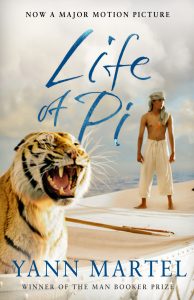
Posted by Anna van Gelderen on 1/5/2003
–Lale wrote–
: I could have done without the gory details of how
: the Zebra was devoured by the hyena. Or the
: “regularity” problems of Richard Parker and Pi.
Yes, so could I. But providing us with these details is also an extremely clever way of the author to make us believe in Pi as a hardheaded factual storyteller who gives us the unadorned truth without leaving anything out – only to challenge this belief at the very end! Very well done.
~
Posted by Anna van Gelderen on 1/5/2003, 12:43:21
Like Len, I think that the crux of the whole novel lies in the daring twist in the tail of the story. Pi’s alternative version suddenly and unexpectedly puts everything in a new light.
Unlike Len, however, I think this goes a lot deeper than simply opting for a more attractive story that is to be preferred over nasty facts. In my own life I am very much for the unadorned truth. I’d rather face that and have done with it than deceive myself with pretty lies. Neither am I a religious person; my conviction is that when you die that’s the end of it for you. But then I have never had anything even closely resembling the shattering, traumatic experiences that Pi has had to live through. The story with the tiger in it is the only way in which he can cope with what he has gone through, the only way in which he is able to make sense of things and continue to live. It’s his anchor, the same role that religious faith serves for millions of people all over the world.
For me there is little doubt that the ‘alternative’ version Pi tells to the Japanese is the factual version of events. Martel has given us a very good pointer with the island, which is such a glaring departure from the starkly realistic goings-on so far that it tests our faith as believers in Pi’s story to the limit. The island clearly can’t be part of the actual world, it belongs to the realm of myth, reminiscent (by the way) of the wanderings of Ulysses. In hindsight it is a very strong hint that the rest of Pi’s story also belongs to the realm of myth.
But does this make the story any less potent? On the contrary, I am sure that most of you will agree with me the story with the tiger in it is and remains an incredibly forceful one. By hinting that it is not a literal version of the facts, the author forces us to reexamine everyting we have read so far and to ponder Pi’s motives for relating his experiences in this manner. For me this actually created a shock. The reexamination for the first time in my life made me able to FEEL (instead of just to be able to explain rationally) what it must be like for other people to have the solace and beauty of myth and religion. Mind you, it did not make me a convert, for I see incredible beauty and solace in life without the help of religion, but this book has given me a very valuable insight that I never possessed before, at least not in such a penetrating way.
And isn’t this what great literature should do: teach us about life by means of a great story? And isn’t Pi’s story a marvellous example of the power of imagination? So dear Reader, I am asking you, in Pi’s words: “[Do Y]ou want a story that won’t surprise you. That will confirm what you already know. That won’t make you see higher or further or differently.”?
Or do you want a story that is marvellous in more ways than one?
Posted by len on 1/5/2003, 16:05:55
Anna misinterprets me:
Unlike Len, however, I think this goes a lot deeper than simply opting for a more attractive story that is to be preferred over nasty facts.
As I agree totally with everything you say that follows, perhaps I was too succinct in my summary of what I thought was the essential point (not the total content) of the novel. Had Martel simply wanted to make that point in an unadorned fashion, he didn’t have to write anywhere near as much stunning prose as he did; he could have done it in a short essay.
len.
~
Posted by len. on 1/5/2003, 15:55:21
Lale observes:
So, I think we can conclude that, yes, he did consider staying there forever because it had food, fresh water and shelter. But, really, it was never the real solution for him.
Of course it wasn’t. The whole island episode was a figment of his deranged imagination.
Does anybody really believe that there are, undiscovered to the rest of the world, floating vegetable islands populated with thousands of meerkats (a burrowing animal native to the Kalahari desert of Southern Africa)?
The story gets more and more unbelievable as it progresses, just as it would if it were the product of a starved, dehydrated castaway.
len.
~
Posted by Chris M on 5/5/2003
For me, this episode was the one really weak part of the book, and in my view could easily have been omitted without detriment.
~
Posted by len. on 9/5/2003, 11:01:47
Chris M writes:
For me, this episode was the one really weak part of the book, and in my view could easily have been omitted without detriment.
But this episode (like the “chance encounter” with the other castaway, only more so) is essential to the entire premise of the book; the increasingly fantastic and unbelievable (albeit more interesting) events that make the “more interesting story”.
Len
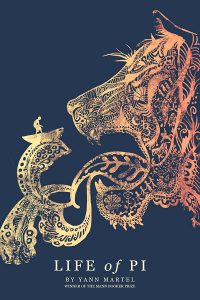
Posted by Hanh on 10/5/2003, 6:31:04
I must agree with Len. It’s the fulcrum in the story, where the realistic becomes the surrealistic. This illustrates the point that, similar to religion, each story has believable and unbelievable elmements. And if we are to accept a story, we must believe all of it, or none of it. This ties in with faith and the suspension of disbelief with respect to the miraculous elements of religion.
I also think the dialog between Pi and the other blind guy completely hilarious. Hey, read it again and let me know if it’s not laugh-out-loud funny!
~
Posted by Hanh on 3/5/2003, 1:01:55
I think Life of Pi is an expansively expressive fable about religion.
Ultimately, religion is a choice, one that we either had direct power over (conversion in adulthood, self-discovery), or one which someone else chose for us (religious “inheritance” by circumstance of birth and culture).
Religion rests at the core on faith, i.e. belief in a Story of Origin: the story of Jesus, of Abraham, of Mohammad, of Siddhartha, etc., documented in the holy books: the Koran, Bible, Torah, etc. Which Story we choose to believe was a decision made initially for us or by us, at some point in our past. Which story holds Truth to us is a personal preference based on which story we THINK is “better”, because faith by definition, carries non-factual elements and thus cannot be proven to be Truth.
“So tell me, since it makes no factual difference to you and you can’t prove the question either way, which story do you prefer? Which is the better story, the story with animals or the story without animals?”
Mr. Okamoto: “That’s an interesting question …”
Mr. Chiba: “The story with animals.”
Mr. Okamoto: “Yes. The story with animals is the better story.”
Pi Patel: “Thank you. And so it goes with God.”
A few key points stand out in the story for me:
(1) The elements of the fantastic which are entrenched in all religions, over which we suspend disbelief in the guise of faith,
and
(2) the difference between Faith and Religion.
I think these 2 extraordinarily complex concepts are illustrated with sublime eloquence.
RELIGIOUS FANTASTICS
In every religion, there are both historical as well as fantastic elements. Many details recounted in most Story of Origins are historical and have been revealed through modern archeology. The fantastic, unprovable, non-scientific elements (resurrection of the dead, the virgin birth, heaven, hell) remain the domains of faith.
These 2 aspects of religion (historical and fantastic) are illustrated in “Life of Pi” by the progression of reality to the oneiric in the raft story (I’d like to take a moment to dedicate the use of the word ‘oneiric’ to our Stephen, who warms the cockles of my heart with his post of thank).
The raft story began with minutely realistic, completely feasible details, but then move slowly to the questionable (a blind French sailor HAPPENS to float by in a raft in the Pacific?), then to the outright fantastic (a carnivorous island). That is the same with religious stories. If we were to read the Torah, Koran, Bible, etc. as Readers and not Believers, our first reaction would be the same: makes sense, makes sense, ….. huh? … that makes sense … makes sense … what? … makes sense … makes sense … YEAH RIGHT!
In essense, what allows us to adopt religion is a selective suspension of disbelief which we call faith. Because religion is beneficial to us (gives us hope, peace), we choose the faith which makes it possible for us to believe AND to live in a rational world. Anything that can’t be proven in the stories of origin, is lumped into the faith basket.
DIFFERENCE BETWEEN FAITH AND RELIGION
Established religion has made Faith (singular/capital F) in-transitive.
faith A leads to religion A
faith B leads to religion B
however, faith A does not lead to religion B
In other words, there is no single Faith that leads to all religions. Without the right faith, the holy books would be puzzling, illogical, unacceptable. Hence the refusal of believers of one religion to accept another. It is not that they are without faith, but they are without the faith proper for that religion. Muslims do not believe that Jesus is the Son of God. Protestants do not believe that the Virgin Mary has divine dispensations. Being unprovable, both core beliefs require the appropriate faith.
Because of his insistence on having Faith (singular, capital F, universal, one-size-fits-all), Pi got in trouble with the priest, rabbi and pandit.
“Bapu Gandhi said, ‘All religions are true.’ I just want to love God,”
That is the ultimate statement of Faith, isn’t it? If you are to live a religious life, that should be the ONLY thing that count, doesn’t it? However religions, as accepted/defined by the establishment, requires that Faith NOT be one-size-fits-all in nature, that the right faith must be adopted to serve the right religion. Believers reject the idea of a single Faith which leads to all religions, because it cannot explain the particular Story of Origin which they have adopted.
“But he can’t be a Hindu, a Christian AND a Muslim. It’s impossible. He must choose.”
Religious leaders, most involved in the faith of their religion, are also the most limited in interpretation. But, these are the people on whom believers depend to interpret their beliefs, hence the perpetuation of the established norm.
“What it comes down to,” the priest put out with cool rage, “is whether Piscine wants REAL religion–or myths from a cartoon strip.”
What he means (being a priest) is that Christianity is the only REAL religion. For Pi, Faith means the single and simple desire to love God.
I think the end (which story to believe) illustrates also the choice we have between having faith and not having faith.
For most people, it is infinitely sad to choose a story where there is nothing after death. Therefore, they choose to have faith in an afterlife, and all the related paraphenalia that go with that story. Analogously, atheists are the people who choose not to believe in the unprovable, even if the story is bad.
RATING
I love this book! It is a fabulous fable. Deep truths hidden behind what is really a (tragic) children’s story. The plot is fantastic (no pun intended). The dialogs are a joy to read, humor belying serious sub-plots.
I give it 5-stars! Ich kann nicht anders.
Posted by moana on 3/5/2003, 3:31:49
Ay! Such a long and beautiful post! A few things in reply, though I cannot touch on all –
The idea of using fantastical elements appreared a bit to me like Marquez’s magical realism – a good thing, it made me like the book more. I agree with your analysis of the progression of real to nonsensical in the story, but I cannot say that the same holds for faith-based texts. I myself couldn’t get past the first part of Genesis where light is created before the stars, or any other matter that could possibly emit photons or even radiation in a non-visible wavelength. I can’t say anything for other texts, as I have only studied the Bible in any depth, but to me it sure starts out like “YEAH RIGHT”
Pi’s choice of Faith is indeed upsetting to the different religions. I don’t suppose I really understand his devotion to attending what I would call “religious” rather than “faith-based” ceremonies, such as Mass or temple. It seems to me that the preaching that all other religions are wrong would get on my nerves if I had to listen to it from all sides all the time. What is interesting to me is why Pi chooses this method of being faithful.
For most people, it is infinitely sad to choose a story where there is nothing after death. Therefore, they choose to have faith in an afterlife, and all the related paraphernalia that go with that story. Analogously, atheists are the people who choose not to believe in the unprovable, even if the story is bad.
I don’t think that Pi chooses his faith because of wanting a belief in an afterlife. I think he chooses his Faith in order to live life on earth as a better person. As for me, I don’t quite understand how there not being anything after death is “infinitely sad”, so long as you live a good life on earth. Therefore, religion and faith are both useful if and only if they make life on earth kinder, happier, and less hurtful. So says Moana called Levi..
What would Pi want in a afterlife, if he did want one? Would he want to be reincarnated, or go to heaven, or what? I can’t remember if this is mentioned in the story. It might clear up some problems…
All in all, I think that this story was entertaining, though it might have spoken to me more were I a religious person. A good read, but it didn’t make me cry or laugh or keep me up thinking at night… three stars.
~moana
~
Posted by Hanh on 3/5/2003, 6:34:00
: in the story, but I cannot say that the same holds
: for faith-based texts. I myself couldn’t get past
: the first part of Genesis where light is created
: before the stars, or any other matter that could
: possibly emit photons or even radiation in a
: non-visible wavelength. I can’t say anything for
: other texts, as I have only studied the Bible in any
: depth, but to me it sure starts out like “YEAH RIGHT”
Yes, definitely Creationism requires full faith, the more literal you read it. But if it was not read literally, figuratively, the Genesis story of Creation can contain in its symbolism the story of the Big Bang. Interpretation is also a choice the reader makes.
I don’t think that ALL of holy writings are fantastic. There are archeologically supported evidence for many situations and personages mentioned in the holy writs of the major religions. There are geological evidence of a massive flood in ancient times which may account for stories of the Flood appearing in the holy books of different religions. Some biblical stories are supported by the writings of ancient historians (for example: Josephus). They are historical documents to some extent. The problem is, we don’t know to what extent. There are mixtures of both reality and fantastic, as parabled beautifully by Pi’s raft story.
: Pi’s choice of Faith is indeed upsetting to the
: different religions. I don’t suppose I really
: understand his devotion to attending what I would
: call “religious” rather than “faith-based” ceremonies, such as Mass or
: temple. It seems to me that the preaching that all
I think that Pi attended Mass/Temple/Mosque because those were the only places where he can find out about religion. He was seeking God and hoped to find Him in those houses. He did not see the difference between those houses of worship because he thought that God is universal. To Pi, Faith would lead to God–universal, non-compartmentalized–he had the perfect universal Faith, in a way. If there is a God, and He wanted a True Believer, it would be Pi and not the priest/imam/pandit.
: I don’t think that Pi chooses his faith because of
: wanting a belief in an afterlife. I think he
: chooses his Faith in order to live life on earth as
: a better person. As for me, I don’t quite
I agree. Pi wanted only to “love God”, he does not need to believe in an after-life. The statement I made does not refer specifically to Pi, but in general to the benefit religion offers to many people (hence its attraction, hence people’s election to have faith). There are many and complex reasons why people choose a religion. I mentioned the after-life as an example because I think the need to believe in it is one of the major attractions. This is evidenced perhaps by the many spiritual conversions that occur near to death.
: good life on earth. Therefore, religion and faith
: are both useful if and only if they make life on
: earth kinder, happier, and less hurtful. So says
Although that may be true for Christianity, I’m not sure if those are universal requirements for all religions. I do not profess to be a religious scholar in any way, but I think that in some fundamentalist traditions (e.g. in Islam and Judaism), glorification of God is the ultimate goal, NOT the creation/perpetuation of a kinder, happier, or less hurtful earth for man. In those traditions, man, his happiness, his being, are of no consequence when compared to the glory of God. Jihad is justified by this belief, holding that secularism is an abomination to God and must be excised.
: All in all, I think that this story was entertaining,
: though it might have spoken to me more were I a
: religious person. A good read, but it didn’t make
: me cry or laugh or keep me up thinking at night…
: three stars.
I’m not a religious person myself, but I do find the discussion (NOT the preaching) of religion fascinating. A discussion about religion is also a discussion about atheism because they are separate faces on the same coin. The selection or denial of religion defines our outlook fundamentally, probably more than anything else. Everything we do, believe in, rests on that foundation. It is the ultimate question into who we are.
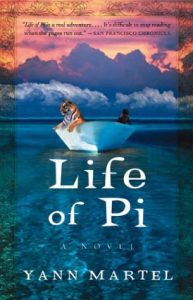
Posted by Dave on 3/5/2003, 7:01:28
Hanh, I think your comment here rings true:
A discussion about religion is also a discussion about atheism because they are separate faces on the same coin.
Remember on page 31 (ch.7) Pi is saying of Dr. Kumar “I felt a kinship with him. It was my first clue that atheists are my brothers and sisters of a different faith, and every word they speak speaks of faith.”
An atheist (greatly simplified here, but nonetheless accurate I think) is someone who places their faith in the belief that God does not exist. They do this by faith, and not by scientific proof of God’s non-existence. They hold to these beliefs as “religiously” as anyone holds to what may be described as the opposite side of the coin, as you suggest.
~
Posted by Dave on 3/5/2003, 6:43:47
I can honestly say that I thoroughly enjoyed Life of Pi on many levels. The adventure itself, the (in my opinion) wonderful descriptive detail, and the way that it begins with all of that philisophical/religious tossed salad effect… little Pi becoming a follower of three different major religions. Wonderful stuff. And don’t even ask me why, but I LOVE Richard Parker… I fell big-time for this beast, who was, through and through… a beast.
And this in itself was something that I thought Martel really carried off well. I was always wondering if this terror-of-the-jungle, this thing that bites hyenas heads clean off at the shoulder blades… if he was going to all of a sudden become Old Yeller, and cuddle up with Pi one evening… purring sweet nothings into his ear.
Never happened…
Bravo Yann! Right up to the end there was this sense that the big guy’s initials could have stood for Really Powerful as much as for Richard Parker. For 227 days, this big cat could have swatted Pi right onto his keester and eaten him… at least I felt this way.
The whole notion of Pi building the raft and spending so much time tethered to the lifeboat… this was ingenious. It was something that I probably would NOT have thought of if I was trying to write the book… yet something I probably WOULD have thought of if I was Pi.
My heartrate for this book is a still-pulsating five.
As some of you are aware, I went to a Yann Martel reading and discussion evening on the 23rd of April, and I will report a bit on it here, in reference to the book itself.
First of all, Yann was extremely interesting, very humble, gracious, very patient with everyone’s sometimes silly questions, and he had big hair. Really big hair. Richard Parker would like to have so much hair! Like a tornado had touched down and stopped just short of lifting him skyward. But… it suited him. He looked very suave… he exuded intelligence, physically and verbally.
The patience of an elephant. During the introduction, someone’s cell phone directly behind me went into something not unlike the Mormon Tabernacle Choir in high gear. The host then directed everyone to turn their cell phones off. Not five minutes into Yann’s reading… another cell phone starts blaring! Yann takes it in stride. But then later, in the question period, Yann was explaining a very deep point, and just when there was that holy hush in the place, and my pen was poised to do that “automatic writing” that one does when one is not even looking down at one’s paper (you’ve been there?)… well, this girl literally jumps up and walks out of the room.
Yann COMPLETELY lost his train of thought. I mean utterly had no idea. Could not say even one more word. It was terrible.
A man who introduced himself as “a minister” came up to the microphone and asked… “You said that the three-toed sloth reminded Pi of God. Can you explain this please?”
(Much laughter in room)…. But when it all died down… Yann gave a wonderful explanation… he said that when we look into the eyes of an animal, “we meet mystery.” He said that we get a profound sense that we are like them… but with this, is an equally profound sense that we are NOT like them. He equated this to our “wonderings” about God. He said “A dog does not have our intellect, and yet it gets by. So, what is the purpose of our intellect? Is it not there that we may attempt an understanding of life that is greater than that of a dog’s?”
He said that Richard Parker was originally an elephant. Can you imagine? Then, he was going to be a rhinoceros (because Yann said the rhinoceros has the most wonderful eyes of any beast). Alas though, the rhino only eats grass….. no good.
All in all, Yann just had a real interesting way of saying stuff.
And after going to this “Evening With Yann” I can say that Hanh’s comments above are really right on the mark. (Hanh… were you there? Was that your damn cell phone?)
Seriously, the book IS “an expansively expressive fable about religion” as she says.
Yann intended it to be so.
Hanh’s comments corroborate near exactly with what Yann was saying about his narrative strategy. He said that his aim was to tell a story that was progressively (increasingly) unbelievable. But, by dint of increased detail… you are compelled to believe the “animal” story when presented with the alternative..
He purposely put the blind cannibal thing in there to make the reader say… “Oh come on… this is ridiculous.” (Even though the whole scenario is based on a verified historical account of two ships that met in the ocean, literally collided into each other, and each ENTIRE CREW were blind. One man chronicled the whole thing in a journal, as he locked himself in a room and listened as people were eating each other.)
Same thing with the floating island… or as Moana called it, the “meercat acid seaweed island”… can you picture that in some Carnival Cruise brochure… Kathie Lee Gifford rattling on about the “all-you-can-eat” Dead Dorado Nightly Buffet?)…
Yann wanted to make the story increasingly “unbelievable, yet compelling.”
I don’t know about you… but there were times when I was asking myself… “Are there such things as floating seven mile wide rugs of seaweed?”
Yann says that he made up the name of “meerkats” and only later did someone tell him that there are things called Meerkats in Disney’s “The Lion King”.
Yann did all of this because he believes that a good novel makes you suspend your disbelief. But he followed this up by saying that this is the same with “a good religion”. It does the same thing. A BAD religion does not succeed at this, and these we call “sects” or “cults”. (His words, not mine). But an interesting perspective I thought.
Anyhoo… the most interesting thing Yann said about the book was when he said he could sum up Life of Pi in three sentences.
These are:
Life is a story.
You can choose your story.
Choose the better story.
The “better” story for Yann (his words) is the one that “makes room for the transcendental”. His said “A story with a transcendent vision is is the better story.”
Yann wanted us to read the second story (the story told to the Japanese investigators) and then have to “make a leap” and ask ourselves which story we were going to “choose” to believe.
One woman came up to the microphone and she was nearly in tears, and she was livid… she was angry with Yann for doing this at the end of the book, because she complained “now I can’t get that second story out of my head, and it’s ruining the first story entirely and I do not know which one to believe.”
Yann looked perplexed, genuinely did not know how to help this woman, I swear she was about to burst into tears, and then he said… “Well, what do I know? I’m just the author!”
(Much laughter… more cell phones going off… general pandemonium…)
And now for some trivia:
Yann says he has not owned a pet in years.
For the past five months he has been teaching a university course in Germany (I forget which city), and this course is entitled “The Animal and Literature.”
A mathematician-type in the audience pointed out to Yann that the fractional equivalent for “pi” is apparently 22/7, or 22 over 7. “Is this why you had Pi out on the sea for 227 days?”
Yann shook his bushy head and said “No.” This was news to him… he had never even heard of this mathematical co-incidence.
He said that he chose the number 227 because it is a prime number, divisible by only one and itself. A representation of Pi’s solitary struggle for survival.
The naming of “Pi” (after the Piscine Molitor) is meant to symbolize a rational rectangular body of water (a swimming pool) cast out into an irrational boundless body of water (the ocean).
“Tsimtsum” is an ancient Hebrew term for the Kabbalah.
Richard Parker was the name of a character in Poe’s “Arthur Gordon Pym” story… this was a guy that was cannabalized. The name also appears three times in several supposed real-life histories of cannibalism on the high seas.
And this… far and away… the funniest moment of the evening….
Yann said that he has had to address numerous inquiries (from women) asking him if this story is a metaphor for marriage. At first he was perplexed, and kept asking “Why?”
Now he knows better.
All of these women tell him that Pi’s relationship with Richard Parker reflects their own relationships with their husband. They have to:
– train him.
– feed him.
– clean up after him.
– and then he leaves you without saying goodbye!
In all seriousness, Yann’s American editor told him that two women have found the courage to leave their husbands after reading the book.
~
Posted by Hanh on 3/5/2003, 18:08:22
Dave, thank you for the marvelous reportage!! It’s a tremendous joy to read, and not only because I’m really glad for the confirmation that I could see what the author intended, your description of Yann Martel is wonderful! Your trivia notes are fascinating! He didn’t know 227 was Pi? What are the odds? There are lots of prime numbers and he picked that one! Transcendentalism, you say?
I REALLY envy you for the opportunity, so I’ll need to do something about it, eh? When are the next such event? May be I’ll fly up and attend. 🙂
~
Posted by len. on 5/5/2003, 17:06:19
Dave writes:
A BAD religion does not succeed at this, and these we call “sects” or “cults”. (His words, not mine).
Pascal Boyen’s book (see another reply of mine elsewhere) explains this difference, what distinguishes a “good” religion from a “bad” religion, quite cogently.
Anyhoo… the most interesting thing Yann said about the book was when he said he could sum up Life of Pi in three sentences. These are:
Life is a story.
You can choose your story.
Choose the better story.
The “better” story for Yann (his words) is the one that “makes room for the transcendental”. His said “A story with a transcendent vision is is the better story.”
As a devout atheist, I’d like to make it clear that I do not believe that transcendance requires faith. The simple truth of our existence is quite sufficient.
~
Posted by Lale on 8/5/2003, 9:41:05
Molitor Swimming Pool – Paris – 1930 (Winter Pool)

Molitor Swimming Pool – Paris – 1989 (Summer Pool)

~
Posted by Christopher on 7/5/2003, 5:47:46
What splendid postings! Hahn’s discussion of the major theme of the novel deserves a special hat’s off. I’m honoured to have been the dedicatee of even one word of such a brilliant analysis (indeed, it was an oneiric moment to imagine myself as Stephen for a while – Lale’s correction brought me swiftly back to earth!).
I enjoyed Life of Pi. It wasn’t a difficult book and sometimes I read things quicker than perhaps I should have. I was wrapped up in the story and the quality of the prose. It seemed to have been written with such ease that one can only imagine the pains Yann Martel must have gone through in order to cultivate and maintain such a high level of literary style. In an interview on CBC he wanted people to remember that Life of Pi didn’t come out of thin air: it was the product of lots of sweat and tears. What’s really great about the work is that the sweat and tears are never on the page. The style is never pompous or tortured or ostentatious and there is a buoyant rhythm that keeps one turning the pages while munching on turtle nuggets or flying fish fins.
The much-hyped, now-famous “twist” was excellent and definitely brought the book to another “level”. In his capacity to relate a story, Martel is truly virtuosic.
Sounds like a 5-star rating, right? Well, not quite. Something about this book bothered me.
In the pianistic world you have the really virtuosic pianists who seem to be able to play anything with their fingers in their noses. What is most marvelous about them is the outstanding ease and confidence they exude, the casualness with which they can execute the most demanding musical passages. Then you have others, more rare, who are equally talented from a virtuosic standpoint, however their virtuosity is not the most obvious characteristic of their interpretative performance. They have something else, that extra thing, the thing that gives you goose flesh, that captivates you with a simple gesture, that has you riveted without knowing why. They have “soul” or “spirit”: something indefinable, transcendental, something almost “God-like”.
For me, Yann Martel doesn’t have that “goose-flesh” thing. He is incredibly virtuosic but his performance made me feel that there was something vacant or hollow at the core of his effort.
In the piano world, virtuosity is a good recipe for winning international competitions. Martel has won his competition. I’m interested to see if he’ll be able to get beyond the stardust now and rise to a higher realm where only few have the honour to pass their time.
4 stars.
~
Posted by Guillermo Maynez on 8/5/2003, 2:01:47
I found Life of Pi extremely interesting and good. Of course I got the essence of it as a religious fable, but I also liked it from antoher point of view, one that has not been expressed by anyone so far. I happen to love stories about the sea. In my list of beloved books and authors, adventures in the sea rank very high, from juvenile and not necessarily masterpieces in literary terms, like Salgari, to deep psychological mysteries and epic stories which take place in the sea and its environment (Arthur Gordon Pym by Poe -with its own Richard Parker-, Moby Dick, Nostromo, etc.). Actually, I even ran out and picked Joseph Conrad’s “Lord Jim” to read in the beach, and I’m loving it.
Sea stories, when good, usually pitch Man against destiny, fate, the forces of nature, and ultimately, with his innermost beliefs, strengths, weaknesses and God. To be stranded in the sea really confronts you with some serious questions, suffering, and plenty of time to think about them if you do not drown right away, in which case there is no story. So I think it was very good that Martel gave us a full background of Pi’s heterodox religious practices and beliefs before sending him out to a shipwreck (we seem to be full of shipwrecks these days).
So the religious background and the Zoo background become indispensable to fully grasping the meaning of the story as well as you can. The bipolar situation against the tiger and the sheer terror it corrrectly inspires in Pi is an added element in the all-by-itself terrible confrontation with nature at its most desolate and indifferent: the high seas. So Pi’s every resource, physical, mental and emotional, is put to an utmost test by loneliness, desolation, the Pacific Ocean and a Bengal tiger. I gladly read the long pages about Pi’s endeavours to survive, and of course I was reminded of a modern day Robinson Crusoe -another shipwreck story with deep and resonant religious themes and overtones- confined to an even smaller refuge.
The carnivorous acidic seaweed island -or whatever Moana called it- episode just seemed to me a magical building up of an incredible voyage. It reminded me a lot of Arthur Gordon Pym, a book which has almost the same structure as Life of Pi: general background of the hero, a believable set of misfortunes, and then very strange incredible and horrible things happening.
But I must confess I was deeply disturbed by the parallel story told at the end. I want to believe the tiger story, but then there will always be this other one, more prosaic and more believable. I’m sorry I read that part, for I would have liked to stay with the first one as the only one.
~
Reviewed by: Mark Date: 25 June 2004
I’m a member of a book club in St. Petersburg, FL, and we’ve recently discussed Life of Pi. As I read through the many insightful comments from members of the book club on readliterature.com, I was fascinated to see how closely this online discussion paralleled our own.
One of the first comments made by a member of our group was very much like the comment made by Guillermo Maynez here, who wrote, “But I must confess I was deeply disturbed by the parallel story told at the end. I want to believe the tiger story, but then there will always be this other one, more prosaic and more believable. I’m sorry I read that part, for I would have liked to stay with the first one as the only one.”
On an emotional level, I understand that completely. It felt like a punch to the solar plexis to read the second story for me. Yet, it’s the second story that ultimately opened up the first story for me in a most amazing way. Without the second story, I’m not sure I would have realized that this book can be read on a variety of levels. Once we recognize (as the Japanese investigators do) that in some ways Pi IS Richard Parker (or at least an aspect of him) then the book actually becomes the kind of never-ending story that Pi so desperately wishes for when he’s on the boat.
Just an example, take the chapter of the floating island, which was also of much interest to our book club. This story is fascinating but, as this discussion shows, literally incredible to some. But if we view it as part of a fable or symbolic universe, then the island is a sort of metaphor: an apparently safe place where our tiger selves (that is, our fierce, instinctual, physical selves) would stay forever, well satiated, if our other rational or spiritual selves didn’t recognize the dangers and force it to leave. I think most people have been on such islands: places where they feel safe and sheltered but which slowly, inevitably eat away at them, causing them to become lesser individuals, with no more stature than tamed, doomed meerkats.
Reading the book in this manner makes it a much richer experience for me. Our group had a very interesting discussion, for example, about why the second story seemed so brutal and grotesque whereas the original story, which contained the animal characters, seemed less so. This led into a debate over our feelings about animal versus human behaviors and our attitudes toward those behaviors. What happens when WE are the animals? How does this affect our view of morality, our status as beings with souls?
There are so many other facets of the book to discuss once the symbolic nature of story is explored. So I think that Martel knew exactly what he was doing when writing that section. I think that ultimately he was giving a gift to his readers: the chance to more deeply appreciate the wondrous, multifaceted, inexplicable nature of the universe, as experienced by so many of us traveling uncomfortably yet gratefully with our personal tigers.
~
Reviewed by: Jubilee Date: 28 November 2004
I’ve recently read the book and find it very well put together. I enjoyed Part 3 for its comical content but questioned the theory of the real life story (cook, sailor, mom…), I thought he was just humoring the Japanese men. I now believe that that was factual, and the animal story was a coping method.
As for the algae island, I am trying to relate it to religion. Similar to Christianity’s ‘Adam and Eve’ story, Pi stumbled upon the forbidden fruit. Similar to Islam, the meerkats all faced the same way; Muslims face Mecca. As for Hinduism, I’m not as successful in finding a story/belief or such to relate the algae island to. Any thoughts?
The naming of Richard Parker is ingenious by the way. I found the virtual discussion both beneficial and fascinating.
At the end of the book, we were provided with Reading Group questions to ponder on. One subject touched was about colors. Green for Islam, orange for Hinduism, but what for Christianity?
~
Reviewed by: Vinnie Date: 10 July 2006
Most people seem to think that the second story given in Life of Pi is the true one, and that the first is an invention. If this is in fact the case, it seems to me the book is more of an argument for atheism rather than a book that “will make you believe in God”.
Regarding the quote from Yann Martel where he said something to the effect that the book could be summed up as “life is a story, so choose the better story”: This would suggest that either the first story in the author’s mind is true, or that he knows faith is false but that it’s better to follow it anyway.
Or more likely, as the author he himself doesn’t know which story is true, he just wrote it and left it up to the reader.
Or, possibly, since the Japanese interviewers believe the animal story, the author really does expect you to believe that version, even if it does seem outlandish.
One bit of the animal story does make me tend to believe it: When Richard Parker disappears into the forest, Pi seems to suffer real grief at the separation. If the tiger is merely his survival instint, I don’t believe he would suffer so much at the parting.
Side note: For what it’s worth, when I was reading the story the first time through and it came to the part about the algae island, I was pretty much certain he was hallucinating due to his deprivation. Then when he told the story he told it as he remembered it, hallucination and all. And to me, that makes the first story ultimately believable.
I realize, however, given the point of the book and all, that this explanation isn’t correct. Or, since I can choose to believe whatever I want, maybe it is.


